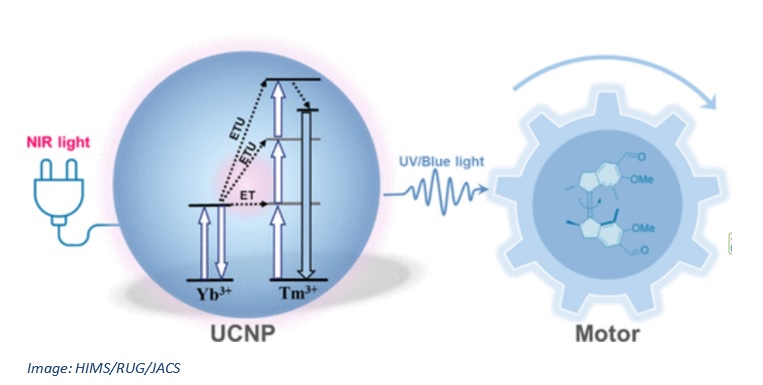Upconversion nanoparticles to aid the application of molecular motors
In a collaboration with the group of Prof. Ben Feringa at Groningen University, Prof. Hong Zhang and his PhD graduate Dr Kefan Wu at the University of Amsterdam’s Van ‘t Hoff Institute for Molecular Sciences have developed upconversion nanoparticles to assist in powering molecular motors. The nanoparticles can convert near-infrared radiation, which is capable of penetrating bulk material, into blue or UV light that can efficiently power the motors. As a result, these motors can now be effectively used to make bulk materials responsive, or act as molecular switches in biological applications. The results were published last month in the Journal of the American Chemical Society.

FSE Science Newsroom | Text University of Amsterdam
The upconversion nanoparticles solve a pressing problem of the real-life application of molecular motors: they are most effectively powered by blue or UV light. When integrated in bulk material or when applied in devices to be used in biological tissue, the short penetration depth of blue or UV light hinders effective activation of the motors. Moreover, UV radiation can be quite harmful.
A solution would be to make the motors susceptible to near-infrared radiation, which provides superior penetration depth and is relatively benign. However, this would require the motors to be adorned with additional molecular groups, complicating their synthesis. Furthermore, it is quite a challenge to realise adequate photo-efficiencies in molecular motors that are directly driven by infrared radiation.
An effective transfer mechanism
In their joint JACS paper, the Groningen/Amsterdam research team now reports a novel strategy to power molecular motors with high efficiency using near-infrared radiation. It builds upon the expertise of Prof. Hong Zang in spectrally tuneable upconversion nanoparticles (UCNPs) that effectively provide a radiative energy transfer mechanism. The UCNPs, consisting of sodium yttrium fluoride and doped with various lanthanide ions, act as nanometre-scale transducers, converting NIR light into UV/visible photons. Upon absorption by molecular motors, these photons trigger unidirectional rotational motion in a way that is comparable to direct excitation by UV/visible light.
A series of experimental results on molecular motors demonstrates the efficacy of this strategy to substitute direct UV/visible irradiation. It is especially useful in biological settings that demand deep light penetration and reduced phototoxicity, and in UV/visible-light-sensitive systems like bulk solids. Additionally, no complicated pre-functionalization of molecules is required. According to the team, the approach exhibits high generality and scope in activating molecular motors with NIR light. This holds significant potential for real applications, using molecular machines in dynamic and smart materials, in particular in the biological domain.
Reference: Jinyu Sheng, Youxin Fu, Kefan Wu, Thomas Freese, Hong Zhang, and Ben L. Feringa: Highly Efficient Near-Infrared Light-Driven Molecular Motor Rotation Enabled by Upconversion Nanoparticles as Nanoscale Light Sources. Journal of the American Chemical Society, 2025
More news
-
17 February 2026
The long search for new physics
-
10 February 2026
Why only a small number of planets are suitable for life
